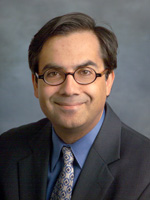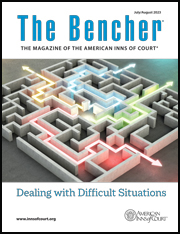Seeking Advice about Compliance with Ethics Rules
The Bencher | July/August 2023
By John P. Ratnaswamy, Esquire

 Sometimes a lawyer is not sure what to do. She might not be sure if a conflict of interest has developed as to a representation, and, if so, what to do about it. He might not be sure whether he has sufficient reason to believe a client has given false testimony and, if so, what are the right next steps. They might be unsure when they can publicly discuss court rulings in a case involving a former client.
Sometimes a lawyer is not sure what to do. She might not be sure if a conflict of interest has developed as to a representation, and, if so, what to do about it. He might not be sure whether he has sufficient reason to believe a client has given false testimony and, if so, what are the right next steps. They might be unsure when they can publicly discuss court rulings in a case involving a former client.
If a lawyer needs advice about what the ethics rules require in a particular situation, may they reach out to another attorney and, for that purpose, may the lawyer disclose confidential information relating to a current or former representation?
American Bar Association (ABA) Model Rule of Professional Conduct (MRPC) 1.6 is the primary MRPC on confidentiality in relation to current clients. MRPC 1.6 states in part:
(a) A lawyer shall not reveal information relating to the representation of a client unless the client gives informed consent, the disclosure is impliedly authorized in order to carry out the representation, or the disclosure is permitted by paragraph (b).
(b) A lawyer may reveal information relating to the representation of a client to the extent the lawyer reasonably believes necessary:
****
(4) to secure legal advice about the lawyer’s compliance with these Rules[.]
****
MRPC 1.9(c), the primary Rule on confidentiality in relation to former clients, in part points generally to MRPC 1.6. The MRPCs are not law, but they largely are followed in most states. A lawyer will need to check their jurisdiction’s law.
MRPC 1.6, Comment [9], briefly explains this confidentiality exception:
[9] A lawyer’s confidentiality obligations do not preclude a lawyer from securing confidential legal advice about the lawyer’s personal responsibility to comply with these Rules. In most situations, disclosing information to secure such advice will be impliedly authorized for the lawyer to carry out the representation. Even when the disclosure is not impliedly authorized, paragraph (b)(4) permits such disclosure because of the importance of a lawyer’s compliance with the Rules of Professional Conduct.
A lawyer seeking advice about compliance with ethics rules should be careful to comply with other applicable ethics rules. For example, the lawyer should take reasonable steps to ensure that potential ethics counsel do not themselves have a conflict of interest in the situation. The lawyer should not disclose to ethics counsel more confidential client information than is reasonably necessary to be disclosed. A lawyer perhaps might not need to disclose any confidential information, if the problem can be presented sufficiently as a hypothetical situation. Depending on the circumstances, the lawyer also might need or wish to consider withdrawal from the applicable representation (see, e.g., ABA MRPC 1.16).
A lawyer seeking advice about ethics compliance also might need to consider the law of evidence. The law of confidentiality in the ethics rules is not the same thing as the law of attorney-client privilege (or the attorney work product doctrine). There has been litigation in many jurisdictions about whether or when communications between a lawyer and their ethics counsel are or are not privileged if sought in discovery by the lawyer’s current or former client in related litigation with the lawyer over alleged malpractice or breach of fiduciary duty or contract. Many of those cases have involved communications between a lawyer and their law firm’s internal ethics counsel, but some cases have involved communications with external ethics counsel.
There might be other legal or practical considerations. For example, the state’s disciplinary authority or a bar association might have an “ethics hotline” that addresses lawyers’ hypothetical questions. Lawyers also might have malpractice insurance that covers the fees of external ethics counsel.
John P. Ratnaswamy, Esquire, is the founder of The Law Office of John Ratnaswamy LLC, located in Chicago, Illinois. He also regularly serves as an adjunct professor of legal ethics at the Northwestern University School of Law. He is a former member of the American Bar Association’s Standing Committee on Ethics and Professional Responsibility. This column should not be understood to represent the views of any of those entities or Ratnaswamy’s or the firm’s current or former clients.